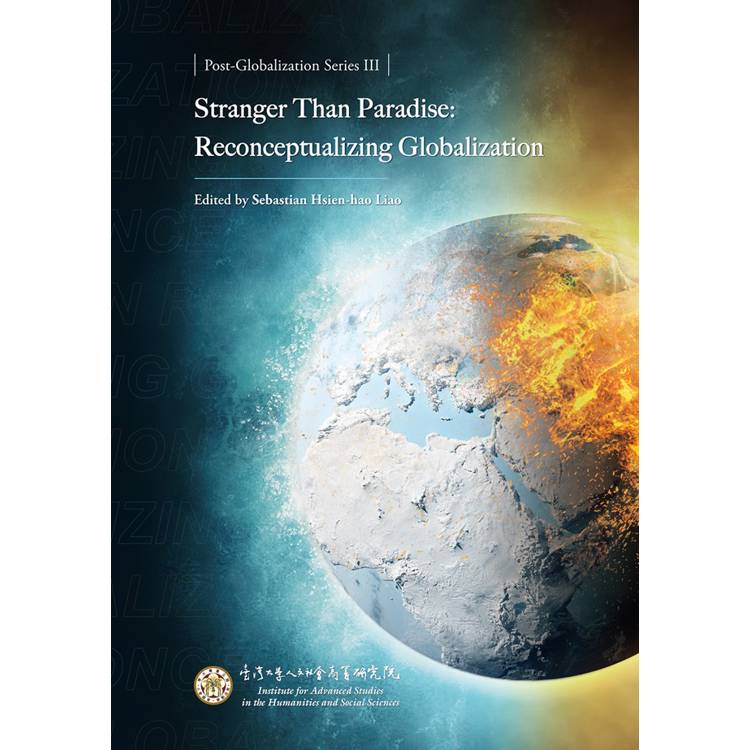This edited volume addresses the phenomenon called globalization by highlighting its neoliberal origins and critiquing its disguising as human destiny from three levels of contemporary culture: existential, national, and transnational. Exposing the masquerading of neoliberal globalization as the perpetual peace after the end of history, the authors of this volume to different extents all call upon us to reflect on its Capital-driven and Western-centric nature and operations, with a view to facilitate its end and explore the possibility of a new phase of global collaborations through which we can tackle the roots of the natural and man-made catastrophes incurred by neoliberal globalization.
| FindBook |
|
有 1 項符合
Sebastian Hsien-hao Liao的圖書 |
 |
$ 355 ~ 428 | Stranger Than Paradise:Reconceptualizing Globalization【金石堂、博客來熱銷】
作者:Sebastian Hsien-hao Liao(廖咸浩)╱編 出版社:國立台灣大學出版中心 出版日期:2024-10-25  共 4 筆 → 查價格、看圖書介紹 共 4 筆 → 查價格、看圖書介紹
|
|
|
圖書介紹 - 資料來源:博客來 評分:
圖書名稱:Stranger Than Paradise:Reconceptualizing Globalization
內容簡介
作者介紹
作者簡介
Luiz Oosterbeek
Luiz Oosterbeek is professor at the Polytechnic Institute of Tomar, and president of the International Council for Philosophy and Human Sciences. UNESCO-IPT chair holder “Humanities and Cultural Integrated Landscape management.” Vice-Director of the Geosciences Centre of Coimbra University. Member of the Portuguese Academy of History, the Portuguese Academy of Sciences and Academia Europaea. Coordinator of research projects in archaeology, heritage and landscape management in Portugal, Africa and Southern America. Prizes and awards: European Commission, Brazilian Lawyers Bar, Portuguese Ministry of Culture, Gulbenkian Foundation, Foundation for Science and Technology among others. Author of over 350 papers and 90 books.
David Theo Goldberg
David Theo Goldberg is Distinguished Professor of Anthropology, Comparative Literature, and Criminology, Law and Society at UC Irvine. His numerous books include Are We All Postracial Yet? (Polity, 2015), and Dread: Facing Futureless Futures (Polity, July 2021). Until 2022, he was the Director of the University of California Humanities Research Institute for more than two decades. Earlier in his career, he produced independent films and music videos (some of which aired on MTV), and co-directed an award-winning short film on South Africa, “The Is/land.”
Inn Buchanan
Inn Buchanan is professor of Critical Theory and Cultural Studies of School of Humanities and Social Inquiry at University of Wollongong, Australia. He has published on a wide variety of subjects across a range of disciplines, with a primary focus on the application of Deleuze and Guattari’s theories. He also has published on film, literature, music, space, the internet and war as well a number of other subjects. He is the founding editor of the journal Deleuze and Guattari Studies and founder of the International Deleuze and Guattari Studies Conference series. He is the author of the Dictionary of Critical Theory (OUP, 2018) and Assemblage Theory and Method (Bloomsbury, 2021). His most recent book is The Incomplete Project of Schizoananlysis (Edinburgh University Press, 2021).
Alex Taek-Gwang Lee
Alex Taek-Gwang Lee is a professor of cultural studies and a founding director of the Centre for Technology in Humanities at Kyung Hee University, Korea. He is also a visiting professor at the Centre for Applied Philosophy, Politics and Ethics at the University of Brighton (UK) and Graduate School at The University of Santo Tomas (Philippines). He served as an academic advisor for Gwangju Biennale in 2017 and as a program manager for the Venice Biennale of Architecture in 2021. He edited the third volume of The Idea of Communism (2016) and Deleuze, Guattari and the Schizoanalysis of Postmedia (2023), and his forthcoming monographs, Communism After Deleuze and The Paradox of Artificial Intelligence, are scheduled for publication in 2025.
Alain Brossat
Alain Brossat is emeritus professor of the Department of Philosophy at Paris 8 University (Saint-Denis). He has taught for many years as a visiting professor at the Institute for Cultural and Social Studies of National Chiao-Tung University in Hsinchu (2014–2021), then one year at the Department of History of NCKU in Tainan (2022–2023).
Dana E. Powell (U.S. citizen/White)
Dana E. Powell (U.S. citizen/White) is Associate Professor (Anthropology) in the Graduate Institute of Medical Humanities, College of Humanities and Social Sciences, at Taipei Medical University. She is an environmental anthropologist working in North America and Taiwan on questions of energy extraction, Indigenous sovereignty, and environmental governance. Powell’s first book, Landscapes of Power: Politics of Energy in the Navajo Nation (Duke Press, 2018), traces a controversial coal plant slated for Diné lands and the resulting re-articulations of environmentalism and justice. Her current transnational project partners with colleagues in Navajo Nation, eastern North Carolina, and Taiwan, to critically examine the lived effects of sustainability and “transition” projects on Indigenous self-determination, recognition, and wellbeing, within statist projects of social inclusion. Powell has taught at Appalachian State University’s Department of Anthropology; Cornell University’s Society for the Humanities; and National DongHwa University’s College of Indigenous Studies.
Earl Tulley (Diné)
Earl Tulley (Diné) was born and welcomed with songs and prayers in the Diné tradition, his umbilical cord planted in the bosom of Mother Earth in his maternal homeland in Bis Dootłizh Ndeeshiizh (Blue Gap in Apache County, Arizona, United States). He is an enrolled member of the Navajo Nation, co-founder of Diné Citizens Against Ruining our Environment and the Indigenous Environmental Network, currently board member of the Peace Development Fund, and Vice Chair of the Navajo Nation Water Rights Commission. Tulley has worked in the housing construction and community development profession for nearly 35 years on the Navajo Nation. His family resides in Tohlakai, New Mexico, and he is a father, grandfather, gardener, and cancer survivor.
Galin Tihanov
Galin Tihanov is the George Steiner Professor of Department of Comparative Literature at Queen Mary University of London. He has held visiting professorships at universities in Europe, North and South America, and Asia. He is the author of six books, including The Birth and Death of Literary Theory: Regimes of Relevance in Russia and Beyond (Stanford UP, 2019) which won the 2020 AATSEEL Prize for “best book in literary studies.” Tihanov has been elected to the British Academy (2021) and to Academia Europaea (2012). He serves on the Executive Board of the Institute for World Literature at Harvard University and as Honorary Scientific Advisor to the Institute of Foreign Literatures, CASS, Beijing; he is also Past President of the ICLA Committee on Literary Theory. His current work is on world literature, cosmopolitanism, and exile.
Camilo Pérez-Bustillo
Camilo Pérez-Bustillo is visiting professor of Human Rights and Social Justice at National Taiwan University (transitional justice, rights of migrants, indigenous peoples), affiliated researcher of the Global Research Programme on Inequality (GRIP, https://gripinequality.org/employee/ perez-bustillo-camilo/) at the University of Bergen (Norway), former Fellow at CASBS-Stanford University, and former Director of Advocacy and Research at Hope Border Institute (El Paso, Texas). Lead author of Human Rights, Hegemony, and Utopia in Latin America: Poverty, Forced Migration and Resistance in Mexico and Colombia (Brill 2016), and co-founder of the International Tribunal of Conscience of Peoples in Movement, and of Witness at the Border: www.witnessattheborder.org. Her most recent book is as translator of The Theological Metaphors of Marx by Enrique Dussel (Duke University Press, 2024).
William A. Callahan
William A. Callahan is professor of Political Science at Singapore Management University. Previously, he was professor of International Relations at the London School of Economics and Political Science, and in 2020–21 was a Taiwan Fellow at National Taiwan University. His most recent book is Sensible Politics: Visualizing International Relations (OUP, 2020), which the won “Best Book Award 2022” from the International Studies Association, International Political Sociology section.
Luiz Oosterbeek
Luiz Oosterbeek is professor at the Polytechnic Institute of Tomar, and president of the International Council for Philosophy and Human Sciences. UNESCO-IPT chair holder “Humanities and Cultural Integrated Landscape management.” Vice-Director of the Geosciences Centre of Coimbra University. Member of the Portuguese Academy of History, the Portuguese Academy of Sciences and Academia Europaea. Coordinator of research projects in archaeology, heritage and landscape management in Portugal, Africa and Southern America. Prizes and awards: European Commission, Brazilian Lawyers Bar, Portuguese Ministry of Culture, Gulbenkian Foundation, Foundation for Science and Technology among others. Author of over 350 papers and 90 books.
David Theo Goldberg
David Theo Goldberg is Distinguished Professor of Anthropology, Comparative Literature, and Criminology, Law and Society at UC Irvine. His numerous books include Are We All Postracial Yet? (Polity, 2015), and Dread: Facing Futureless Futures (Polity, July 2021). Until 2022, he was the Director of the University of California Humanities Research Institute for more than two decades. Earlier in his career, he produced independent films and music videos (some of which aired on MTV), and co-directed an award-winning short film on South Africa, “The Is/land.”
Inn Buchanan
Inn Buchanan is professor of Critical Theory and Cultural Studies of School of Humanities and Social Inquiry at University of Wollongong, Australia. He has published on a wide variety of subjects across a range of disciplines, with a primary focus on the application of Deleuze and Guattari’s theories. He also has published on film, literature, music, space, the internet and war as well a number of other subjects. He is the founding editor of the journal Deleuze and Guattari Studies and founder of the International Deleuze and Guattari Studies Conference series. He is the author of the Dictionary of Critical Theory (OUP, 2018) and Assemblage Theory and Method (Bloomsbury, 2021). His most recent book is The Incomplete Project of Schizoananlysis (Edinburgh University Press, 2021).
Alex Taek-Gwang Lee
Alex Taek-Gwang Lee is a professor of cultural studies and a founding director of the Centre for Technology in Humanities at Kyung Hee University, Korea. He is also a visiting professor at the Centre for Applied Philosophy, Politics and Ethics at the University of Brighton (UK) and Graduate School at The University of Santo Tomas (Philippines). He served as an academic advisor for Gwangju Biennale in 2017 and as a program manager for the Venice Biennale of Architecture in 2021. He edited the third volume of The Idea of Communism (2016) and Deleuze, Guattari and the Schizoanalysis of Postmedia (2023), and his forthcoming monographs, Communism After Deleuze and The Paradox of Artificial Intelligence, are scheduled for publication in 2025.
Alain Brossat
Alain Brossat is emeritus professor of the Department of Philosophy at Paris 8 University (Saint-Denis). He has taught for many years as a visiting professor at the Institute for Cultural and Social Studies of National Chiao-Tung University in Hsinchu (2014–2021), then one year at the Department of History of NCKU in Tainan (2022–2023).
Dana E. Powell (U.S. citizen/White)
Dana E. Powell (U.S. citizen/White) is Associate Professor (Anthropology) in the Graduate Institute of Medical Humanities, College of Humanities and Social Sciences, at Taipei Medical University. She is an environmental anthropologist working in North America and Taiwan on questions of energy extraction, Indigenous sovereignty, and environmental governance. Powell’s first book, Landscapes of Power: Politics of Energy in the Navajo Nation (Duke Press, 2018), traces a controversial coal plant slated for Diné lands and the resulting re-articulations of environmentalism and justice. Her current transnational project partners with colleagues in Navajo Nation, eastern North Carolina, and Taiwan, to critically examine the lived effects of sustainability and “transition” projects on Indigenous self-determination, recognition, and wellbeing, within statist projects of social inclusion. Powell has taught at Appalachian State University’s Department of Anthropology; Cornell University’s Society for the Humanities; and National DongHwa University’s College of Indigenous Studies.
Earl Tulley (Diné)
Earl Tulley (Diné) was born and welcomed with songs and prayers in the Diné tradition, his umbilical cord planted in the bosom of Mother Earth in his maternal homeland in Bis Dootłizh Ndeeshiizh (Blue Gap in Apache County, Arizona, United States). He is an enrolled member of the Navajo Nation, co-founder of Diné Citizens Against Ruining our Environment and the Indigenous Environmental Network, currently board member of the Peace Development Fund, and Vice Chair of the Navajo Nation Water Rights Commission. Tulley has worked in the housing construction and community development profession for nearly 35 years on the Navajo Nation. His family resides in Tohlakai, New Mexico, and he is a father, grandfather, gardener, and cancer survivor.
Galin Tihanov
Galin Tihanov is the George Steiner Professor of Department of Comparative Literature at Queen Mary University of London. He has held visiting professorships at universities in Europe, North and South America, and Asia. He is the author of six books, including The Birth and Death of Literary Theory: Regimes of Relevance in Russia and Beyond (Stanford UP, 2019) which won the 2020 AATSEEL Prize for “best book in literary studies.” Tihanov has been elected to the British Academy (2021) and to Academia Europaea (2012). He serves on the Executive Board of the Institute for World Literature at Harvard University and as Honorary Scientific Advisor to the Institute of Foreign Literatures, CASS, Beijing; he is also Past President of the ICLA Committee on Literary Theory. His current work is on world literature, cosmopolitanism, and exile.
Camilo Pérez-Bustillo
Camilo Pérez-Bustillo is visiting professor of Human Rights and Social Justice at National Taiwan University (transitional justice, rights of migrants, indigenous peoples), affiliated researcher of the Global Research Programme on Inequality (GRIP, https://gripinequality.org/employee/ perez-bustillo-camilo/) at the University of Bergen (Norway), former Fellow at CASBS-Stanford University, and former Director of Advocacy and Research at Hope Border Institute (El Paso, Texas). Lead author of Human Rights, Hegemony, and Utopia in Latin America: Poverty, Forced Migration and Resistance in Mexico and Colombia (Brill 2016), and co-founder of the International Tribunal of Conscience of Peoples in Movement, and of Witness at the Border: www.witnessattheborder.org. Her most recent book is as translator of The Theological Metaphors of Marx by Enrique Dussel (Duke University Press, 2024).
William A. Callahan
William A. Callahan is professor of Political Science at Singapore Management University. Previously, he was professor of International Relations at the London School of Economics and Political Science, and in 2020–21 was a Taiwan Fellow at National Taiwan University. His most recent book is Sensible Politics: Visualizing International Relations (OUP, 2020), which the won “Best Book Award 2022” from the International Studies Association, International Political Sociology section.
目錄
Series Preface / Sebastian Hsien-hao Liao
Introduction: Why Post-globalization? / Sebastian Hsien-hao Liao
Part I Surviving Globalization
From Global Warming into a New Ice Age? Climate, Adaptation and Examples from the Past / Luiz Oosterbeek
States of Dread / David Theo Goldberg
Towards A Global Aquarium Studies / Ian Buchanan
Part II (Mis)Imagining the Nation
Existential Distortion: Korean Literature and the National Question / Alex Taek-Gwang Lee
The Dead End of "Bilingualism" / Alain Brossat
Climate Change in a Time of COVID-19: Living and Transforming the Syndemic in the Navajo Nation / Dana E. Powell with Earl Tulley
Part III Re-encountering Transnationality
Exilic Inscriptions: Migration and the Resistance to (World) Theory / Galin Tihanov
Peoples in Movement: Migrants, Indigenous Peoples, and Transitional Justice
in Contemporary Latin America / Camilo Pérez-Bustillo
Visualizing International Relations: A Manifesto / William A. Callahan
Contributors
Introduction: Why Post-globalization? / Sebastian Hsien-hao Liao
Part I Surviving Globalization
From Global Warming into a New Ice Age? Climate, Adaptation and Examples from the Past / Luiz Oosterbeek
States of Dread / David Theo Goldberg
Towards A Global Aquarium Studies / Ian Buchanan
Part II (Mis)Imagining the Nation
Existential Distortion: Korean Literature and the National Question / Alex Taek-Gwang Lee
The Dead End of "Bilingualism" / Alain Brossat
Climate Change in a Time of COVID-19: Living and Transforming the Syndemic in the Navajo Nation / Dana E. Powell with Earl Tulley
Part III Re-encountering Transnationality
Exilic Inscriptions: Migration and the Resistance to (World) Theory / Galin Tihanov
Peoples in Movement: Migrants, Indigenous Peoples, and Transitional Justice
in Contemporary Latin America / Camilo Pérez-Bustillo
Visualizing International Relations: A Manifesto / William A. Callahan
Contributors
|










